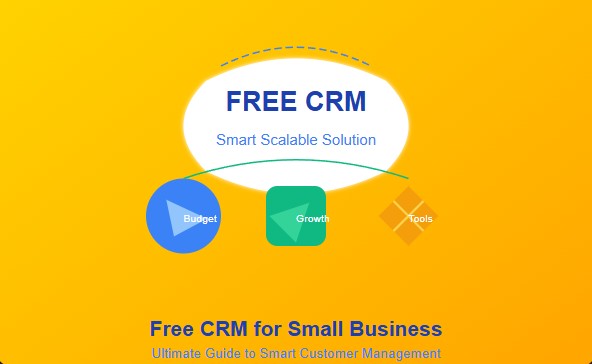In today’s digital-first economy, building and maintaining strong customer relationships is no longer optional—it’s mission-critical. But for small businesses working with tight budgets, investing in expensive software tools can be a challenge. That’s why free CRM for small business has become one of the hottest search terms on the internet—and for a good reason.
This comprehensive guide breaks down what a CRM is, why it matters, and the best free CRM tools tailored for small businesses. Whether you’re a solopreneur, startup founder, or running a growing team, this article will help you choose the right free CRM that scales with your vision—without draining your wallet.
Table of Contents
💡 What Is CRM and Why Does Your Small Business Need It?
CRM stands for Customer Relationship Management. It’s a system that helps businesses organize, automate, and synchronize every aspect of customer interaction—from lead generation and follow-ups to sales conversion and customer support.
For small businesses, CRM tools offer:
-
Centralized contact management 📇
-
Automated follow-ups and reminders 🕒
-
Sales pipeline tracking 📈
-
Email marketing integration 📬
-
Analytics and reporting 📊
Without a CRM, small businesses often rely on spreadsheets, sticky notes, or disjointed tools—leading to missed opportunities and customer churn.
✅ Benefits of Using a Free CRM for Small Business
Why go free? Here’s what you get without paying a dime:
🧩 1. Affordability
Zero cost means you can test and use powerful features without upfront investment.
⚡ 2. Increased Efficiency
Automate repetitive tasks and spend more time on growth activities.
🤝 3. Better Customer Relationships
Stay organized and provide personalized, timely communication.
📈 4. Sales Optimization
Track leads through every stage of your funnel and focus on the hottest prospects.
🧠 5. Data-Driven Insights
Analyze performance and customer trends to make smarter decisions.
Free doesn’t mean basic—many platforms offer full functionality suitable for small teams and solopreneurs.
🔝 Top 7 Free CRM Platforms for Small Business in 2025
After deep testing, reviews, and community feedback, here’s our handpicked list of the best free CRMs for small businesses:
1. HubSpot CRM
Best For: All-round free CRM with unlimited users.
-
Features:
-
Contact & pipeline management
-
Email templates and tracking
-
Meeting scheduler
-
Chatbot and live chat
-
Marketing and sales integrations
-
Limitations: Branding in free email tools, limited reporting customizations.
Verdict: HubSpot is the gold standard for free CRM—easy to use, scalable, and great for beginners.
2. Zoho CRM Free Edition
Best For: SMBs needing deeper automation and multi-channel engagement.
-
Features:
-
Lead and contact management
-
Workflow automation (basic)
-
Email marketing integration
-
Mobile app support
-
Limitations: Max 3 users in the free plan.
Verdict: Best if you want a future-ready CRM you can grow into—starts free, scales affordably.
3. Freshsales (by Freshworks)
Best For: Small teams focused on pipeline and lead scoring.
-
Features:
-
Built-in email and phone
-
Lead scoring and automation
-
Contact and deal management
-
Limitations: Limited reporting in free version.
Verdict: Excellent UI, great for sales-focused small teams.
4. Bitrix24
Best For: All-in-one business management including CRM, project, and task tools.
-
Features:
-
Contact & pipeline management
-
Website builder
-
Team collaboration tools
-
Invoicing and quotes
-
Limitations: Interface can feel complex at first.
Verdict: Ideal for teams that want more than just CRM—like internal project collaboration too.
5. Agile CRM (Free Plan)
Best For: Sales and marketing automation on a budget.
-
Features:
-
Email marketing automation
-
Web engagement tools
-
Landing page builder
-
Limitations: Max 10 users but capped features.
Verdict: Great for tech-savvy users who want marketing tools too.
6. EngageBay (Free Tier)
Best For: All-in-one CRM + Marketing + Helpdesk for solopreneurs.
-
Features:
-
Email campaigns
-
Lead generation tools
-
Contact segmentation
-
Limitations: Limited contacts and emails/month in free plan.
Verdict: Lightweight but powerful. Perfect for startups and micro-businesses.
7. Capsule CRM (Free Plan)
Best For: Simplicity and elegance.
-
Features:
-
Contact management
-
Task tracking
-
Calendar and opportunity pipeline
-
Limitations: Max 250 contacts and 2 users.
Verdict: Sleek UI and minimal learning curve. Great for service-based businesses.
🛠️ How to Choose the Right Free CRM for Your Business
Here’s how to evaluate and choose the perfect free CRM solution:
| Criteria | What to Look For |
|---|---|
| Ease of Use | Intuitive interface, quick setup, minimal training |
| Customization | Ability to adjust fields, pipelines, tags |
| Scalability | Paid plans that grow with your needs |
| Integration Options | Gmail, Outlook, Zoom, Shopify, WordPress, Slack, etc. |
| Mobile Access | iOS and Android apps for on-the-go access |
| Support | Free plans often have limited support—check documentation |
📈 Real-World Example: Using Free CRM in a Small Business
Let’s say you run a small event management company with 3 staff:
-
Use HubSpot CRM to track leads from Facebook Ads.
-
Schedule meetings with prospects using the built-in calendar.
-
Create automated email sequences for follow-ups.
-
Assign tasks to your assistant when a lead reaches the proposal stage.
With zero software cost, you now have a fully functional digital sales team.
🔄 When Should You Upgrade from Free to Paid?
While free CRMs are powerful, there comes a time when upgrading is inevitable. Watch for these signs:
-
You’ve hit contact/user limits.
-
You need advanced automations.
-
Reporting and analytics are too basic.
-
You want white-label or branding control.
-
You need priority support or API access.
The beauty of starting with a free CRM is you test the waters without commitment, then upgrade only when it’s necessary.
🔐 Is Free CRM Really Safe?
Yes—as long as you choose reputable providers like HubSpot, Zoho, or Bitrix24.
However, keep these security tips in mind:
-
Use strong admin passwords.
-
Don’t store sensitive data unless encrypted.
-
Regularly export data backups.
-
Read the provider’s privacy and data ownership policies.
💬 Final Thoughts: Is a Free CRM Right for Your Small Business?
Absolutely.
Free CRMs offer the perfect entry point for small businesses looking to organize their customer data, improve follow-ups, and boost sales—without any financial risk. These platforms have matured into robust, feature-rich systems that can compete with many paid solutions.
So whether you’re a freelance consultant, a growing e-commerce brand, or a five-person agency, free CRM tools are the smartest way to start building customer loyalty and revenue momentum.




